Singapore has long been known as a nation built on systems. When new policies emerge, their implications often extend beyond the surface. Recently, the Ministry of Manpower (MOM) signaled that
a comprehensive review and amendment of the Employment Act, aiming to “adequately protect all categories of employees while accommodating business development.”
While this may sound like positive news for professionals, it is far from a bystander’s topic for foreign professionals currently applying for or planning to apply for Singapore’s Employment Pass (EP) and Permanent Resident (PR) status.
Labor law amendments often serve as a “barometer”: they dictate corporate hiring rules and indirectly determine whether foreign talent can successfully settle in Singapore—or even remain long-term.

I. Revision Context: Why Now?
1. Shifting Workplace Trends
With the rise of artificial intelligence, remote work, and the platform economy, Singapore’s workplace is undergoing profound transformation. Traditional distinctions like “9-to-5” schedules and “blue-collar vs. white-collar” roles no longer adequately capture today’s employment landscape.
An increasing number of PMEs (Professionals, Managers, and Executives) require expanded protection—a group that forms the backbone of EP and PR applicants.
2. Complexifying Employment Relationships
Frequent mergers and acquisitions often leave employee rights under Employment Transfer (Section 18A of the Employment Act) ambiguous. Foreign workers, in particular, face pressing questions: Are visas and contracts protected if their company is acquired? This necessitates clearer legislative definitions for transfer mechanisms.
3. Dual Pressures: Wages and Career Paths
MOM explicitly states that rising median wages and evolving employment dynamics necessitate legal adaptation. This implies future EP salary benchmarks and job classifications may be recalibrated to balance “fairness and competitiveness.”
In essence, this is not merely an “employee protection” amendment but a sweeping overhaul of Singapore’s labor market order.
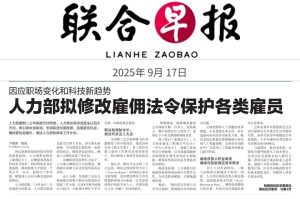
Source: MOM, Lianhe Zaobao

II. Core Revisions: Three Key Words
According to Zheng Deyuan, Assistant Secretary-General of the National Trades Union Congress, this revision focuses on three key areas:
1. Raising the Salary Threshold
Currently, the basic monthly salary ceiling for non-manual workers is S$2,600, which is clearly outdated. Future increases will directly impact who qualifies for Employment Act protections.
Impact on Foreign Workers:
The minimum salary threshold for Employment Pass holders was raised to S$5,000 in 2023 (S$5,500 for the financial sector). If the scope of labor law protections expands accordingly, companies may increasingly favor hiring locally for “cost-controlled” employees, making competition for foreign talent more challenging.
2. Greater Clarity on Employment Transfer
The interpretation of Section 18A will be clarified, ensuring greater transparency in the transfer of employment relationships during company mergers, acquisitions, or restructurings—applicable to both foreign and local employees.
Impact on Foreign Workers: Previously, many EP holders faced uncertain status during company acquisitions. With clarified rules, foreign employees may gain stronger safeguards for visa continuity in such scenarios.
3. Enhanced Protection for PMEs
Professionals, Managers, and Executives (PMEs) will receive enhanced protection—a critical development since the vast majority of EP holders and future PR applicants fall precisely into this PME category.
Impact on Foreign Nationals:
While the policy prioritizes protecting PMEs, authorities may concurrently strengthen considerations for prioritizing local PMEs in hiring. This implies foreign nationals must demonstrate they “bring incremental value” rather than “compete with locals for existing positions.”
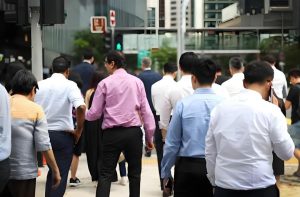
Source: Lianhe Zaobao

III. Ripple Effects on Foreign EP Applications
What do these revisions mean for foreign EP applicants? Consider the following three dimensions:
1. Salary Thresholds and Position Value Synchronized
With potential increases in base salary caps and MOM’s ongoing adjustments to EP salary requirements, future EP applications will increasingly emphasize “high salary + high skills.” Ordinary mid-level positions will gradually be filled by local talent, forcing foreign applicants to position themselves in “unique specialties” or “critical roles” to stand out.
Examples:
IT AI specialists, biomedical R&D personnel, green economy consultants—these are strategic sectors officially designated by Singapore. In contrast, EP applications for generic roles like marketing or administration will become increasingly challenging.
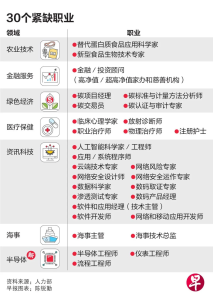
Source: MOM, Lianhe Zaobao
2. Greater Emphasis on Employment Stability
The revised Section 18A may benefit foreign EP holders during mergers and acquisitions, providing stronger legal grounds for their employment status.
However, MOM may also require employers to submit more detailed proof of corporate stability when applying for or renewing EPs. This poses a significant challenge for startups or SMEs hiring foreign workers.
3. Local Hiring Priority and Fair Consideration
MOM has consistently emphasized the Fair Consideration Framework, which may be further tightened. In EP applications, companies must more clearly demonstrate “why foreign workers are hired instead of Singaporeans.”
In other words, EP holders must serve as “complementary talent” rather than “replacement talent.”
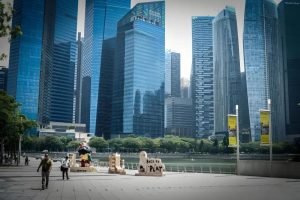
Source: Lianhe Zaobao

IV. Potential Changes to PR Applications
Foreign nationals applying for Singapore PR typically need to demonstrate “stable employment + long-term contribution.” Amendments to the Employment Act will also implicitly impact PR applications.
1. Employment Stability and Legitimacy
Stricter employment transfer mechanisms ensure foreign employees can move between companies legally and stably. This will make it easier for ICA (Immigration and Checkpoints Authority) to recognize applicants’ “long-term employment capability” during PR application reviews.
2. Salary Levels and Professional Positioning
With overall salary thresholds rising, the benchmark for future PR applications will also increase. Highly-paid Professionals, Managers, and Executives (PMEs) will gain easier recognition, while foreign nationals in lower-paying or non-critical industries will face greater difficulty entering the PR talent pool.
3. Social Integration and Inclusive Orientation
MOM’s policy direction emphasizes “more inclusive growth.” This benefits not only citizens but also implicitly signals to foreign communities: PR applications are no longer solely about “having money and a job,” but about “whether you have genuinely integrated into Singapore’s multicultural society.”
For example: Do you have family roots here? Do you have long-term plans to live in Singapore? Do you participate in community activities? These “soft indicators” may become increasingly important.

Source: Lianhe Zaobao

V. Macro Context:
Singapore’s Dual Calculation
Stepping back from the Employment Rules, we see this revision as part of a larger strategic framework.
1. Economic Blueprint Reshaping
MOM emphasizes driving growth through AI, robotics, green economy, and digital economy. EP and PR applicants specializing in these fields will undoubtedly benefit.
2. CPF System Upgrade
MOM simultaneously announced an increase in the Basic Reserve Savings (BRS) for CPF accounts. This signals the government’s expectation of longer lifespans and higher expenditures among Singaporeans. For foreign nationals, it also sends a clear message: Singapore seeks to attract “long-term contributors” rather than “short-term gold diggers.”
3. Financial Security and Fraud Prevention
The Monetary Authority of Singapore (MAS) has prioritized combating fraud and safeguarding the financial system. This underscores Singapore’s commitment to maintaining its status as a “secure financial hub.” For foreign nationals seeking long-term residency, this represents an environmental safeguard.
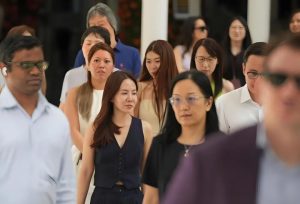
Source: Lianhe Zaobao

VI. Challenges and Opportunities Coexist:
Strategies for Foreign Nationals
While policy changes are unpredictable, strategic approaches remain within control. The following points may assist foreign applicants in better navigating these changes:
1. Target Strategic Industries
Artificial intelligence, green economy, biotechnology, and fintech are sectors actively promoted by the government. Entering these fields not only strengthens EP applications but also facilitates PR approval.
2. Enhance Salary Alignment with Skills
EP and PR approvals increasingly prioritize “high compensation + unique expertise.” Foreigners should proactively elevate their professional value—such as obtaining international certifications or leading multinational projects—to demonstrate irreplaceability.
3. Demonstrate Long-Term Contribution and Social Integration
PR applicants should showcase multifaceted ties to Singapore: tax records, family relationships, community involvement, and even children’s education can all serve as positive factors.
4. Proactively Secure Employment Stability
When selecting employers, prioritize not only compensation but also the company’s stability and compliance capabilities. Future reviews may assess not just your individual qualifications but also your employer’s strength and adherence to regulations.
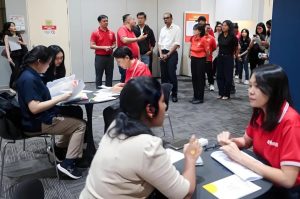
Source: Lianhe Zaobao
Conclusion: Navigate the Shift, Adapt to the Trend
Singapore’s Ministry of Manpower (MOM) revision of the Employment Rules, while ostensibly protecting employee rights, represents a “labor market upgrade.” For foreign nationals, this signals both heightened barriers and more focused opportunities.
If you are preparing to apply for an Employment Pass (EP) or Permanent Resident (PR) status, understand that future Singapore will place greater emphasis on:
Whether you are an “essential” talent rather than a “replaceable” employee;
Whether you plan to establish long-term roots rather than “work and leave”;
Whether you can contribute incremental value to society rather than merely “sharing the pie.”
In other words, the winds are shifting, but those who know how to sail with the wind often go further.
